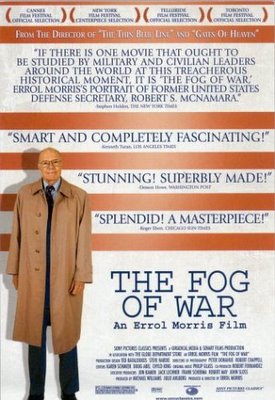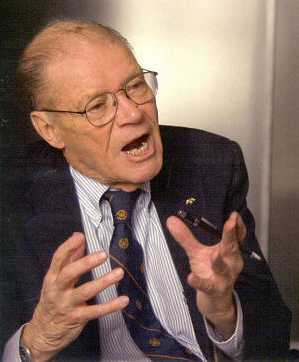Umm Zaid wrote: "How often do you feel obligated to condemn or speak out against something when no one has specifically asked you to? For example, many of us feel obligated to repeat, over and over, the fact that we don’t condone terror, etc. It’s true, but I don’t think it’s effective.
"My feeling is that by now, people who are really interested in knowing what the regular Mozzies of the mainstream think about terror have figured it out, and only those who are interested in stoking the flames of hate still say, “Why don’t they condemn terrorism?” every time a Muslim dares to raise his or her head."
I don't. I gave up "apologizing" for the misdeeds of others long ago. I'm not interested in abasing myself in front of others for whom an "apology" isn't owed. If they don't like it, too bad for them.
When I was working on my recent post, The Fog of War, I read an interesting comment by director Errol Morris in an interview he had with Tom Ryan, film critic for the Australian newspaper, The Sunday Age. In the interview, Morris talked about how Robert McNamara hasn't "apologized" for his role in the Vietnam War, and he ultimately wondered why people expected McNamara to apologize. As a result of this thinking, he came up with his "theory of apologies," which I think is directly applicable to Umm Zaid's situation.
Tom Ryan: Did your view of McNamara change, though, as you were sitting there talking to the man, watching him close to the edge of tears as he talks about the death of Kennedy, seeing him actually confess to you his sense of guilt? Or do you read that still as a kind of performance for the public?
Errol Morris: Can't it be both? For example, people get very angry at McNamara because, they say, he hasn't apologised. “How come you didn't get him to apologise?” Sometimes they get angry at me. And I remember thinking, “At what point during the interview do I want to hear this man apologise? Is this really what I want to hear?” And I thought to myself, “No, I don't. Because there is no apology for Vietnam. Fifty-eight thousand Americans dead, literally millions of Vietnamese. Why would I want to hear 'I'm sorry'?”
And then I started to wonder: why is it so important to people that he apologise? Why is this such a big thing for many, many people? And I developed a theory of apologies – that we like apologies because they empower us. If someone you don't like apologises to you, you can just say, “I don't accept your apology. Screw you!”
I believe that people wanted McNamara to apologise so they could reject it.
-- Errol Morris, Robert McNamara and The Fog of War
Likewise, I won't apologize for the burning of the various embassies, nor the flag burnings, nor some of the stupid placards. Nor do I apologize for various terrorist incidents. I didn't do them. Nor is Islam at fault, which means that I won't apologize on behalf of my religion either. Nor do I expect the Danish people in general or the Danish government to apologize either because, like me, they are not directly responsible for this controversy. However, I do expect apologies from the cartoonists, from JP's editors, and from all the other editors who have published these cartoons. I will also say that none of the "apologies" JP has issued have been, IMO, sincere. I expect these apologies to be sincere, not for my sake, but for their sake. The cartoonists and editors will be questioned about their deeds by Allah (swt), and I wonder just how far a "freedom of expression" excuse will go with Him.
Some other Muslim bloggers have said they believe that this controversy is a test from Allah (swt), and that is something I can buy into. But it's not just a test for Muslims, as they have implied, to see how well we will react. It's also a test for the Danes and other Europeans. Indeed, all of the world. And it is with sorrow that I see that these Danes, Europeans, and others are failing the test as well, exposing themselves to the world to be racist, intolerant, hypocritical bigots.
But I don't expect them to apologize.
Showing posts with label Robert McNamara. Show all posts
Showing posts with label Robert McNamara. Show all posts
February 8, 2006
February 1, 2006
The Fog of War
 Pop quiz, hotshot. Name the war being discussed in the following quotation:
Pop quiz, hotshot. Name the war being discussed in the following quotation:"The war, which we can neither win, lose, nor drop, is evidence of an instability of ideas. A floating series of judgments, our policy of nervous conciliation, which is extremely disturbing."
Yeah, I know, you want to say "Iraq," but in fact the war in question was Vietnam. This is a quotation from Senator Hugh D. Scott, Jr. (R-Pa), as quoted by President Lyndon Johnson in Errol Morris' Academy-award winning documentary, The Fog of War. Several weeks ago, this movie appeared on one of the local TV channels, where I was able to watch most of it. Fascinated by the movie, I happened to find recently a VCD copy of the film for sale for a little less than S$5 (about US$3) and, of course, I immediately bought it. The movie is an interview/video memoir of Robert S. McNamara, the highly controversial Secretary of Defense during the Kennedy and Johnson administrations (and, later, president of the World Bank). The movie has the subtitle, "Eleven Lessons from the Life of Robert S. McNamara," and these lessons are interesting in their own right. (Although, in an interview, Morris said that McNamara himself didn't like the "lessons" and wanted them deleted from the film.) The lessons are:
1. Empathize with your enemy.
2. Rationality will not save us.
3. There's something beyond one's self.
4. Maximize efficiency.
5. Proportionality should be a guideline in war.
6. Get the data.
7. Belief and seeing are both often wrong.
8. Be prepared to reexamine your reasoning.
9. In order to do good, you may have to engage in evil.
10. Never say never.
11. You can't change human nature.
 I'm not going to discuss these lessons at length or try to give the context in which McNamara relates these lessons. For that you should either watch the movie or read the transcript. However, I would like to talk a little bit about Lesson #9, "In order to do good, you may have to engage in evil." When I first saw this movie, I recoiled a bit from this "lesson." After all, we are all taught that "two wrongs don't make a right." And yet, after watching the film last night, I remembered the following ayah from the Qur'an:
I'm not going to discuss these lessons at length or try to give the context in which McNamara relates these lessons. For that you should either watch the movie or read the transcript. However, I would like to talk a little bit about Lesson #9, "In order to do good, you may have to engage in evil." When I first saw this movie, I recoiled a bit from this "lesson." After all, we are all taught that "two wrongs don't make a right." And yet, after watching the film last night, I remembered the following ayah from the Qur'an:"Fighting is ordained for you, even though it be hateful to you; but it may well be that you hate a thing the while it is good for you, and it may well be that you love a thing the while it is bad for you: and God knows, whereas you do not know." (2:216)
And it occurred to me that perhaps McNamara's lesson and this ayah are trying to express the same truth. I know this ayah has disturbed a lot of Christians (especially American Christians) who believe that it gives Muslims a carte blanche to engage in violence*; however, like Islam, Christianity has its own Just War Theory, the roots of which go back at least to the time of the writing of the Book of Judges (see Chapter 5, The Song of Deborah). The problem, of course (regardless of the Muslim or Christian perspective), is in knowing whether one's fighting is properly sanctioned. Is this violence that I'm doing acceptable to Allah (swt), or am I going to pay for it on the Day of Judgment? It is always best in these situations to err on the side of caution.
- Unfortunately, these same Christians are unaware that the Qur'an also places strong limitations on when and how the fighting will be done, along with who (and what) may be engaged in fighting.
For other links, see also:
The Fog of War (Official Site)
The Fog of War (IMDB)
Subscribe to:
Posts (Atom)